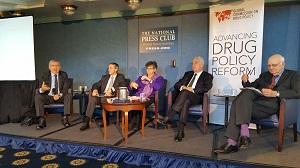In a report released Monday, global leaders denounced harsh responses to drug use, such as the mass killing of drug users in the Philippines under President Rodrigo Duterte, and called for worldwide drug decriminalization.

Since its inception in 2011, the Commission has consistently called for drug decriminalization, but this year's report goes a step further. Unlike existing decriminalization policies around the world, where drug users still face fines or administrative penalties, the report argues that no penalties at all should attach to simple drug possession.
"Only then," the report says, "can the societal destruction caused by drug prohibition be properly mitigated."
And the report breaks more new ground by calling for alternatives to punishment for other low-level players in the drug trade, including small dealers who sell to support their habits, drug mules, and people who grow drug crops. Many of those people, the report notes, engage in such activities out of "economic marginalization… a lack of other opportunities… or coercion," yet face severe sanctions ranging from the destruction of cash crops to imprisonment and even the death penalty.

"After years of denouncing the dramatic effects of prohibition and the criminalization of people that do no harm but use drugs on the society as a whole, it is time to highlight the benefits of well-designed and well-implemented people centered drug polices," said former Swiss President Ruth Dreifuss, Chair of the Commission. "These innovative policies cannot exist as long as we do not discuss, honestly, the major policy error made in the past, which is the criminalization of personal consumption or possession of illicit psychoactive substances in national laws."
"At the global, regional or local levels, drug policies are evolving," added César Gaviria, former president of Columbia and Global Commission member. "However, in order to build solid and effective policies to mitigate the harms of the last 60 years of wrong policies, and to prepare for a better future where drugs are controlled more effectively, we need to implement the full and non-discretionary decriminalization of personal use and possession of drugs."
The new report from the Global Commission on Drug Policy issues the following recommendations:
1. States must abolish the death penalty for all drug-related offenses.
2. States must end all penalties -- both criminal and civil -- for drug possession for personal use, and the cultivation of drugs for personal consumption.
3. States must implement alternatives to punishment for all low-level, nonviolent actors in the drug trade.
4. UN member states must remove the penalization of drug possession as a treaty obligation under the international drug control system.
5. States must eventually explore regulatory models for all illicit drugs and acknowledge this to be the next logical step in drug policy reform following decriminalization.

The Global Commission on Drug Policy was established in 2010 by political leaders, cultural figures, and globally influential personalities from the financial and business sectors. The Commission currently comprises 23 members, including nine former heads of states and a former Secretary General of the United Nations. The high-level group's mission is to promote evidence-based drug policy reforms at international, national and regional levels, with an emphasis on public health, social integration and security, and with strict regard for human rights.
Comments
Full repeal of drug Prohibition
The Global Commission on Drug Policy
A Landmark Report! Congratulations to the Commission members.
Add new comment